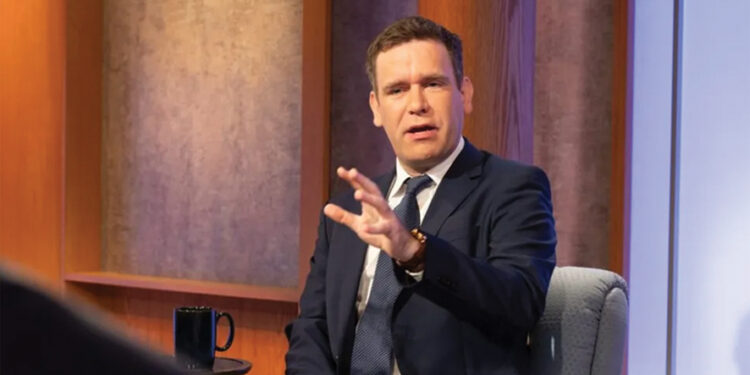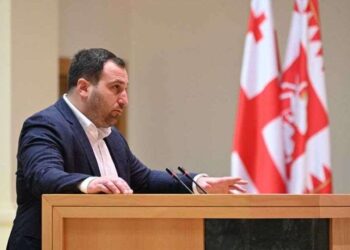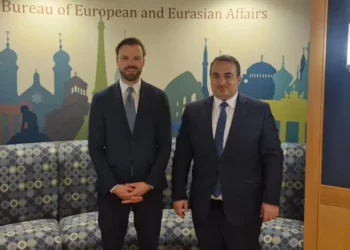Radio Free Europe/RL’s Georgian Service spoke to Tom Rogan, the foreign policy writer and editor for the Washington Examiner who last year was placed on Russia’s terrorist registry as a “wanted” man. In our sit-down with him, we discussed the sanctions against Bidzina Ivanishvili and what to expect from the incoming Trump administration on Ukraine, Georgian Dream, and Georgia’s “two president” dilemma.
Ivanishvili sanctioned – How significant is the decision? What’s the impact?
I think it is significant. That it’s taken this long is problematic, and is symptomatic of the Biden National Security Council’s dithering. It gave the Georgian government and Ivanishvili himself the sense that essentially the United States is going to turn a blind eye to their conduct. But it sets the initiative for the next administration as well.
What does it mean for Ivanishvili personally? Has he been politically and socially tainted by this?
Yes, I think so. It also serves as a potential precursor to secondary sanctions on his interests. The fundamental point is that he becomes essentially a persona non grata in the Western financial system. And it provides opportunities for the Trump administration, or indeed the Biden administration, in their last 30 days in office, to take other steps towards sanctioning individuals or entities that might continue to do business with Ivanishvili. The important point is signaling to him that he has made his choice – he has closed the door on his engagement with the West. He can’t balance what he has been doing with continued essential access and cordial relations with the Western financial system.
Does the message also say that there is no turning back?
I think it does. I think it clearly reflects something that should have been quite obvious to the Biden administration weeks ago, that this is not someone who is interested in dialogue or debate. The United States’ only recourse with him is to respond in a more forceful manner. And, importantly, these sanctions would not have been introduced if the Biden administration thought that the Trump administration would quickly withdraw them. Because that would obviously be embarrassing and would undermine US foreign policy in a general sense. It is setting what I think is a new course of approach in terms of the US government, and it is likely that the Trump administration will take a whole range of further steps if Ivanishvili and Georgian Dream don’t back down and respect the will of the Georgian people and its constitutional obligations.
You’ve written that GD hopes Trump will treat them the same way he has treated Hungary’s Viktor Orbán: accepting their rhetorical praise while overlooking their actions that run counter to US interests. Could Orbán liaise on GD’s behalf, perhaps vouch for them? Would Trump be inclined to listen?
I think Trump likes “Orbán the Strongman,” but he is oblivious to the level of service that Viktor Orbán and Hungary are providing China in blatant contradiction to critical US security interests, getting greater European support to deal with Chinese espionage, intellectual property theft, harassment of Taiwan, Japan, etc. And when some of the financial links below the surface between Orbán and the Chinese, and what he is doing, become apparent to Trump when he starts having to read the detailed security briefings, I think Orbán may have a problem. And, obviously, the natural extension of that is Georgian Dream’s very close relationship – strategic partnership, even – with China and Orbán. What possible rationale do they see beyond them occasionally saying nice things about Trump for him not to take a tough stance towards them? Especially when so many on the streets of Georgia are very pro-American and offer a different path in terms of US-Georgia engagement. So I think there’s a lot of delusion on behalf of Georgian Dream that is probably going to get punctured quite quickly.
Could it be that Orbán is a valuable enough ally to Trump that he’d be willing to overlook his more blotched record? Does Trump care enough about this country to not do Orbán a favor if asked?
I don’t think so, because if you look at the key area where Orbán has tried to influence Trump, in terms of Ukraine, Orbán’s big thing is “cut military aid to Ukraine immediately and you provide the ingredient for peace” – well, there are increasingly apparent indications from the incoming Trump administration that they are not going to do that, because they understand that the key measure of leverage over Russia is the provision of military aid. And so Orbán is essentially being ignored in the main area where he’s trying to have most influence.
I think what Trump likes about Orbán at the moment is that he sees him as someone who speaks very favorably, has spoken very favorably, about him, in a way that many world leaders have not. Trump obviously has a not insignificant ego and that appeals to him. But in the substance of policy, I think Orbán’s been lucky in that he’s been able to go to Mar-a-Lago or meet Trump and say, “you’re the best thing in the universe.” Well, when Trump becomes president and starts looking for policy action from Hungary and sees that on basically every point of interest, including Ukraine, Orbán actually offers the countermanding interest to that of the United States, there’s going to be a problem.
And once he returns to the White House, there’ll be much stiffer competition when it comes to people telling him that he’s the best thing in the universe.
Of course. I mean, look at Emmanuel Macron, who essentially spent the last four years saying that Trump is the end of American democracy, and within one visit to Notre Dame, Trump is saying that Macron is a great guy and they did great things together and they’re going to do it again. So, yeah, the competition for Trump’s favor will increase. And the Trump administration, as far as foreign policy is concerned, will be countering China. And Georgian Dream, much like Viktor Orbán, is a bought-and-paid-for puppet of China. And again, in the central point, what can Viktor Orbán offer Trump beyond rhetoric?
So what’s their “trump” card, then, so to say?
They don’t have one. And they think they do because they think that all they need to do is keep saying that he’s the best thing in the world. But as you pointed out, every foreign leader is essentially saying that now. And those foreign leaders also have policy that serves Trump and America’s foreign policy interests in a way that Orbán and Ivanishvili fundamentally do not. They are essentially banking their policy on Trump being stupid. If you look at his political revival, he is not a stupid man. Whatever you think of his character, this is not a stupid person.
Could they be banking more not on him being stupid, but on him being disinterested enough and willing to toss this matter over to Russia as some sort of bargaining chip in negotiations to come?
Well, if they are thinking that, I would say they are even more delusional. I mean look how invested Trump already seems to be in preparing foreign policy action, very bold, risky foreign policy action, in terms of potentially even escalating with Russia in order to get them to make concessions to Ukraine; the policies in regards to tariffs, including with allies like Canada. Anyone who thinks that Trump is not interested in foreign policy is not paying attention to the available facts. And as one example, President Trump speaks often and very favorably about his personal relationship with Xi Jinping. Well, look at what he’s saying about tariffs to come on China. And look who he has appointed to the senior positions at the Pentagon. Marco Rubio, Mike Waltz – these are not individuals who could be described in any other way than China hawks. No one in Beijing is going to be happy about who Trump has appointed and what kind of policies he is promising, even if he says he likes Xi Jinping.
Your argument presumes that Trump will be so boorish as to not to make any concessions to Putin. Is that realistic? If concessions are to be made, could Georgia not be insignificant enough in Trump’s eyes that he’ll be willing to make that concession in favor of shinier and brighter things in return?
Ukraine is going to be asked to make concessions as part of any peace deal. I don’t think there’s any doubt about that. But at the same time, I don’t really see how Georgia would become part of the bargain. What’s going to happen with regards to Russia and Ukraine is going to be quite specific to Russia and Ukraine. And to a degree, NATO and America’s allies in Europe.
Among other things, Georgia finds itself today in a presidential dilemma – Salome Zurabishvili doesn’t recognize her successor, Mikheil Kavelashvili, as legitimate. How are the two viewed from the US? Is there a question of legitimacy when it comes to the two?
I think the Biden administration clearly sees the outgoing president as the legitimate president. And while it’s unclear where the Trump administration would stand on that question, the incoming Georgian president is clearly a blatant anti-American in terms of his rhetoric and in his views, and so I don’t think it realistic that he is going to be someone that the Trump administration are going to look favorably upon, based on what he has said and the interests he serves- it’s a very, very delusional point of view. Based on everything we’ve seen, I don’t think it’s a stretch to think that Ms. Zurabishvili would retain the Trump administration’s support.
Interview by Vazha Tavberidze














